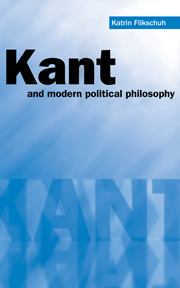Book contents
- Frontmatter
- Contents
- Acknowledgements
- List of Kant's works and abbreviations
- Introduction
- 1 Kantian metaphysics in contemporary liberalism
- 2 The metaphysics of freedom as an idea of reason
- 3 The morality of external freedom
- 4 The Lex Permissiva: property rights and political obligation in the Rechtslehre
- 5 The general united will and cosmopolitan Right
- 6 The metaphysics of Kant's cosmopolitanism
- Select bibliography
- Index
3 - The morality of external freedom
Published online by Cambridge University Press: 22 September 2009
- Frontmatter
- Contents
- Acknowledgements
- List of Kant's works and abbreviations
- Introduction
- 1 Kantian metaphysics in contemporary liberalism
- 2 The metaphysics of freedom as an idea of reason
- 3 The morality of external freedom
- 4 The Lex Permissiva: property rights and political obligation in the Rechtslehre
- 5 The general united will and cosmopolitan Right
- 6 The metaphysics of Kant's cosmopolitanism
- Select bibliography
- Index
Summary
The capacity for desire is the capacity to be by means of one's representations the cause of the objects of these representations. The capacity of a being to act in accordance with its representations is called life.
(MM, 211)INTRODUCTION
The previous chapter emphasised the lawlikeness of Kant's metaphysics of freedom as an idea of pure practical reason, focusing on two aspects of lawlikeness. The first concerned the analogy between the laws of causality, on the one hand, and the laws of freedom, on the other, and, in a more extended sense, the relation between human finitude and the idea of freedom, as indicated in the shift from a cosmological to an anthropocentric perspective. In the third antinomy, the idea of practical freedom arises in connection with human beings' recognition of their limited claims to knowledge. Given their epistemic dependence on the concept of causality, and given the morally unsettling implications of the latter's infinite regress in its empirical application, it is both natural and futile for finite reasoners to inquire into the causal law's ultimate grounds. It is natural in so far as the prospects of an infinite regress are themselves barely intelligible to finite rational beings (hence the thesis' claim that the causal law implies an unconditioned first cause). But the search for such an uncaused first cause is also futile in so far as questions concerning it arise for finite rational beings precisely because they are incapable of answering them.
- Type
- Chapter
- Information
- Kant and Modern Political Philosophy , pp. 80 - 112Publisher: Cambridge University PressPrint publication year: 2000



